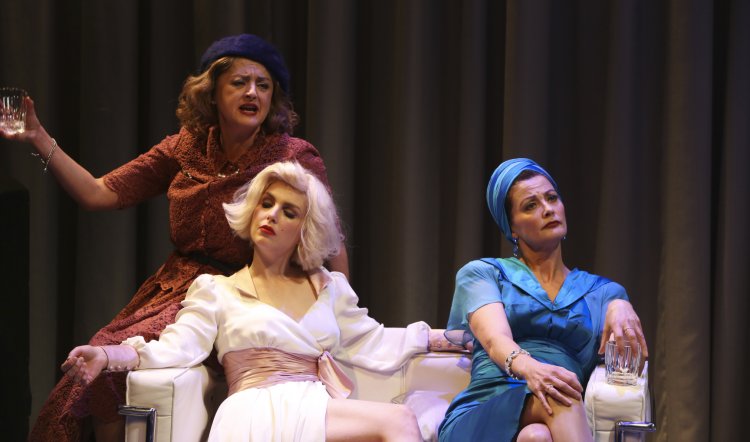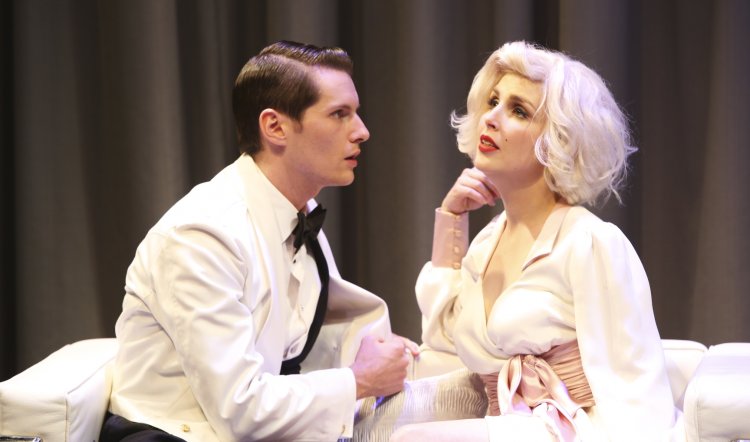
DARK VOYAGER
DARK VOYAGER, Ensemble Theatre, 24 July-30 August 2014. Photography by Natalie Boog: above - Jeanette Cronin, Lizzie Mitchell and Kate Raison. Right: Eric Beecroft and Lizzie Mitchell.
This new play by John Misto is billed as “a sparkling new comedy inspired by real events”. It’s also described as “biting and crisp as a dry martini” but let’s allow that bit to pass for now. The premise is potentially entertaining: imagine a supper date at the Hollywood home of infamous gossip queen Hedda Hopper (Belinda Giblin). Invitees are ageing superstar Joan Crawford (Kate Raison) and her ageing superstar rival Bette Davis (Jeanette Cronin). In close attendance is Hedda’s butler and aspiring actor (natch) Skip (Eric Beecroft). It is 1962 and the two stars have just completed filming of Whatever Happened to Baby Jane? As in real life, the two had fought non-stop during filming and the movie was widely expected to be a flop at the box office. This anxiety is part of the underlying tension of the play as they continue to bicker and snipe.
In reality, the film went on to become a considerable hit around the world. (And it made both women a truckload of money as each had a percentage of the gross in lieu of higher up-front salaries.) But at this fictitious supper party, that was in the unknown future. Instead, the two women trade poisonously barbed insults, quips and one-liners back and forth with Hopper as gleeful referee to their slanging match. Some of it is funny, some of it is witty, some is eye-wateringly acid, but a lot of it is simply too much and too repetitive, or is lost in a tangle of screeching and screaming from fine actors who appear frequently to be lost and without a leader.
At some point Crawford wagers Davis that she can get Marilyn Monroe to turn up to the supper and, when she does – after the interval in the person of Lizzie Mitchell – the play makes yet another turn of style and pace and a sinister undercurrent becomes apparent. Via phone calls we learn that Hedda is on close personal terms with notorious FBI boss J Edgar Hoover. His (real life) penchant for ladies’ underwear and general persecution was then unknown to the great unwashed of the USA and he was a feared and revered figure in public life. In Dark Voyager he is in cahoots with the equally vile broadcaster Walter Winchell and Hopper to keep Hollywood’s influential stars in line. At least, that’s Misto’s idea and as history has been revealed in recent times, it is not far fetched.
What is downright peculiar and at times cruel, however, is the way Marilyn Monroe is treated by the playwright’s fiction. In 1962 Monroe was incandescently beautiful at 36 yet had just been fired from Something’s Got To Give. Within months she would be found dead in her bed from an accidental overdose of prescription drugs. In Dark Voyager she arrives for dinner whacked to the eyeballs and fulfilling every cliched image that’s come down over the years of the ditzy silly bitch who basically deserved it. So, within a few pages of wisecracks and vicious quips, Joan Crawford who, Misto reckons, had an affair with her, is trying to smother the virtually comatose superstar with a cushion. Hello?
For her part, Bette Davis sneers, snarls and capers like a banshee as she hurls abuse at Monroe for killing Clark Gable (the adored star whose death shortly after the wrap of The Misfits was but one death associated with that film). Monroe – in the play – endures all this with befuddled patience and occasional counter-attacks with some nice quips and smart observations. Nevertheless, it’s hard not to view her as the victim of as much mistreatment and hatred here as occurred in real life – weird, unsettling and finally distressing.

There’s also a sub-plot involving wire coat hangers (yawn), Crawford’s adopted children, the butler and a career-nobbling stammer, but never mind.
To be fair, Bette Davis’s extreme bitterness and bile in this play could be due to the breathtakingly hideous brown lacy jacket and skirt outfit she wears throughout. It has to be one of the ugliest outfits every inflicted on an actress and even one as attractive and powerful as Jeanette Cronin can’t rise above it. Horrible. Kate Raison, as the ever Pepsi-sipping Crawford is better served with signature padded shoulders and swathed fabric plus chic turban, all in a pleasing shade of aquamarine. Lizzie Mitchell, of course, is clad in a draped white gown that echoes her Seven Year Itch dress in its relationship to her bosom and peachy flesh. Designer Anna Gardiner is also responsible for Hedda’s living room set which, in 1962, is stylishly but incongruously all black and white Art Deco. Odd.
On the evening of July 31 the audience chortled and guffawed and obviously enjoyed the show. Some laughs were of the kind and in places where others might find them disturbing, but entertainment was definitely going down. On the upside: the “sparkling new comedy” does have sparkles, it’s definitely new and there is also a fair bit of comedy. On the downside: it’s way too long, is a jumble of too many ideas, and is in need of expert and immediate attention from a dramaturg/director of high skills and much experience. Yet again, it’s a case of someone coming up with an apparently bright idea (see Macbeth review) and no one else saying, “okay, and then what?”
In other words, it needed a Rodney Fisher to take the script and writer out the back and do fierce and ruthless things to both before inflicting the play on valiant actresses who almost manage to carry it off. Almost.



